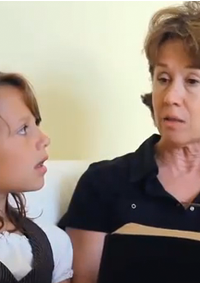“We know that people respond much better to a coach they find inspiring and who shows compassion for them, rather than one who they perceive to be judging them.”
This is Your Brain on Good Mentoring
Professors Richard Boyatzis and Anthony Jack measure brain activity to study the best approaches for mentoring
 In the visual cortex region of the brain, neural activation lights up the MRI screen, showing a firework of activity.
In the visual cortex region of the brain, neural activation lights up the MRI screen, showing a firework of activity.
This reaction is the result of a positive mentoring experience in which coaches motivated students by having them envision their future successes. This same effect—the flurry of activity in the visual cortex—was not seen in the "negative" mentoring group, which relied on more commonly used mentoring tactics, such as pointing out mistakes and giving tips on how to improve performance.
In the experiment—designed by professors Richard Boyatzis, PhD, the H.R. Horvitz Professor of Family Business, and Anthony Jack, PhD, principal investigator of the Brain, Mind and Consciousness Lab at Case Western Reserve University—subjects were mentored using one of two techniques and later had their brains scanned and imaged to see which method produced more neural activity.
The study involved mentors appealing to either the subject's positive or negative emotional attractor, areas of the brain that produce emotions and cause neuroendocrine system reactions. Boytatzis and Jack found that when subjects were mentored in compassionate and mindful ways, their parasympathetic nervous system was activated, which enables individuals to open up cognitively, perceptionally and emotionally—and leads to better performance and mental flexibility. Conversely, the subjects who were mentored using more traditional techniques—such as by reminding them of what they 'ought' to do—tended to make the subjects feel defensive or guilty and caused them to close down.
"We know that people respond much better to a coach they find inspiring and who shows compassion for them, rather than one who they perceive to be judging them," says Jack. "And we found that students tended to activate areas of their brains associated with visioning more so when they had a compassionate coach, even when the topics they were thinking about weren't so positive."
These interesting and informative results are the latest in a series of studies that have been conducted at Case Western Reserve over the past 25 years on the nature of mentoring relationships.
Their findings can make an impact in a variety of applications beyond professors mentoring students, notes Boyatzis. "Many interpersonal relationships, such as doctors and nurses working with patients, or a manager with a subordinate, involves the use of mentoring," he says. "And fine-tuning the most effective mentoring skills means individuals will be more receptive to learning and therefore better able to use the lessons later."
See more of the picture: Watch a video on this research.

